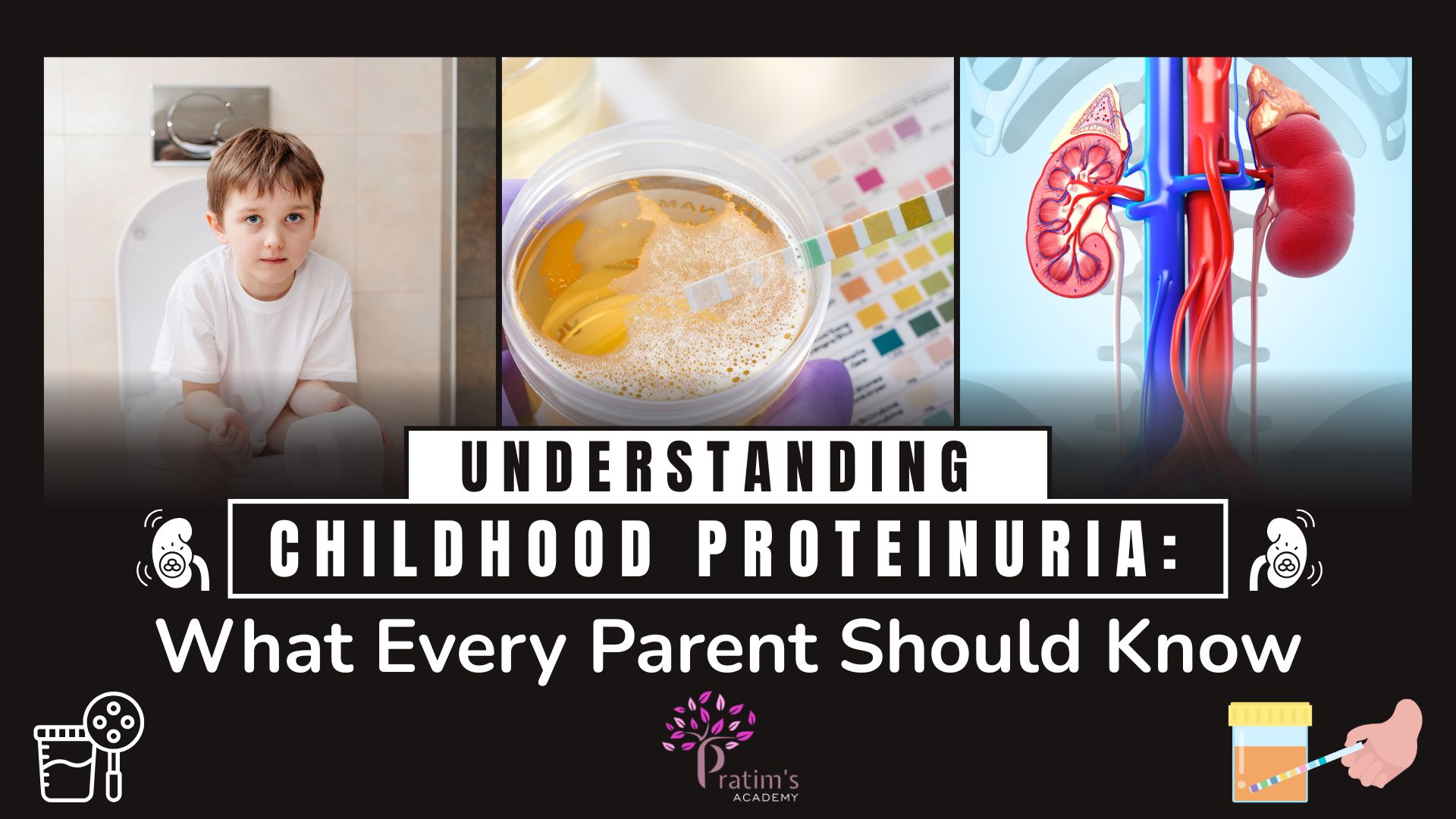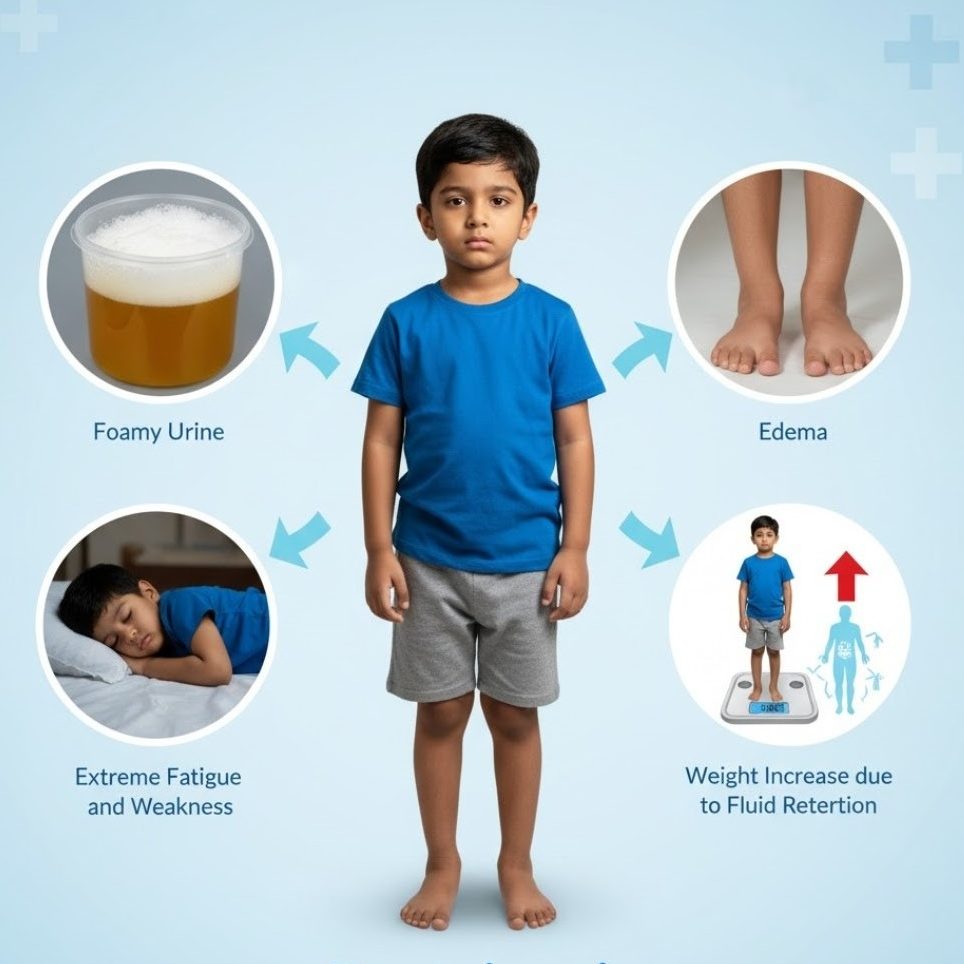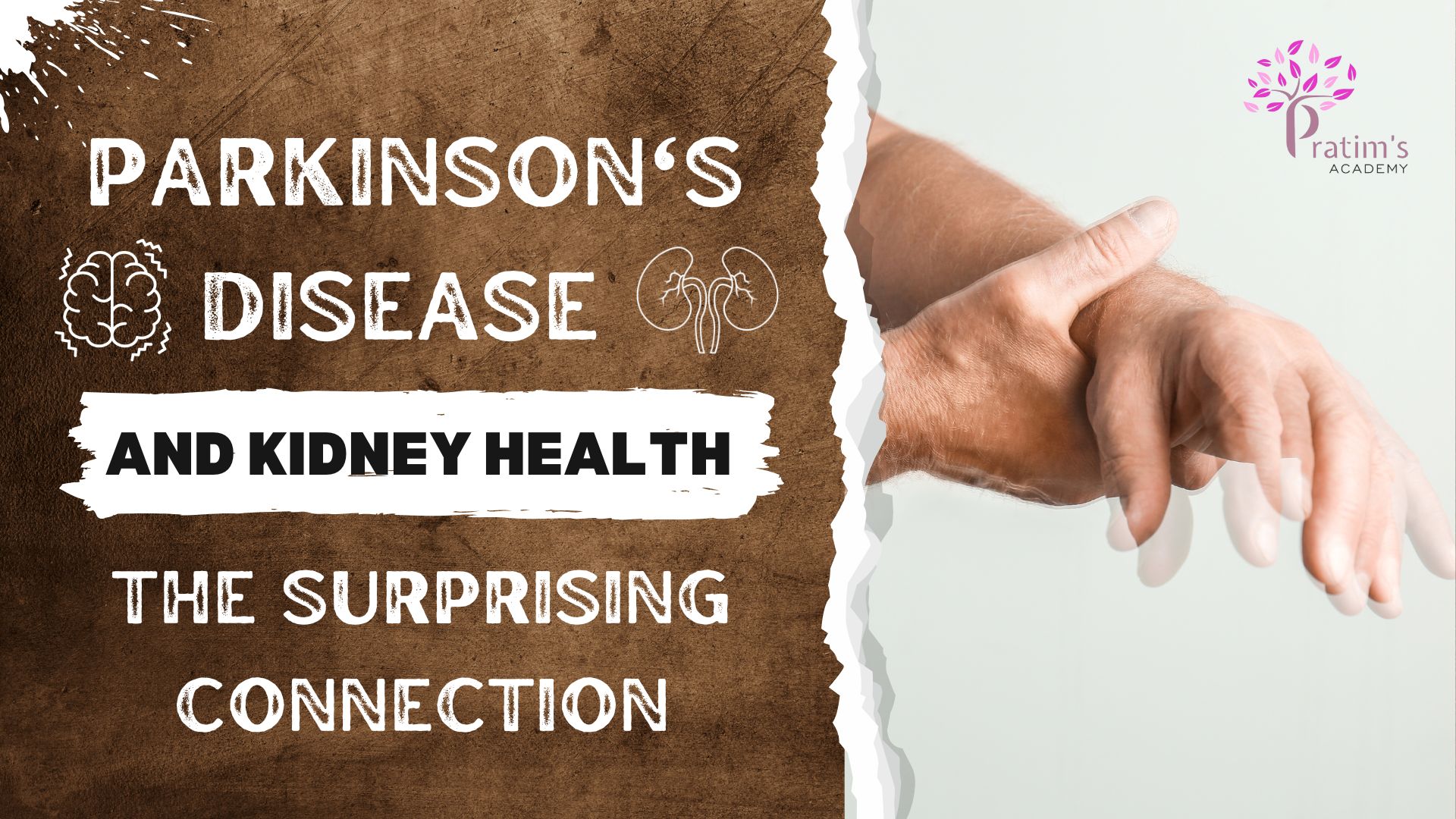
- 11
- 0
Childhood Proteinuria: What Every Parent Should Know
Have you noticed your child’s urine looking foamy or bubbly or that their ankles and eyelids seem a bit puffy? It can be alarming, but this could be a sign of a condition called proteinuria, where excess protein leaks into the urine. While this might sound serious, in many cases, it’s temporary and harmless. However, sometimes it signals a deeper kidney issue that needs attention. This guide will help you understand what childhood proteinuria is, what causes it, what signs to watch for, and how to care for your little one effectively.
Childhood proteinuria refers to the presence of an abnormal amount of protein in a child’s urine, a situation that can cause concern for parents and caregivers. This condition may arise from a range of factors, including harmless and temporary situations like fever or dehydration, as well as more serious underlying health issues such as kidney disorders or systemic conditions that impact overall well-being. Parents may notice that their child’s urine appears foamy or bubbly, which can be a significant change. Furthermore, there may be swelling in certain areas such as the eyelids, ankles, and legs, suggesting fluid retention in the tissues. While proteinuria itself is generally not painful, it can occur alongside other symptoms, including high blood pressure, which may indicate a more serious health concern.
This guide will help you understand what childhood proteinuria is, what causes it, what signs to watch for, and how to care for your little one effectively.
What Exactly Is Proteinuria?

Normally, the kidneys work like careful gatekeepers, letting waste flow out into the urine while keeping important things, like proteins, safely in the blood. But sometimes, that gate doesn’t close as tightly as it should. When this happens, proteins, especially ex- albumin, slip through into the urine. This condition is known as proteinuria. It’s the body’s way of whispering that the kidneys may not be working at their best, and it’s a signal worth listening too.
Why Is This Happening? Common Types & Causes in Kids
Most of the time, it’s harmless and disappears on its own, like a passing ripple. But sometimes, it can be an early whisper from the body, hinting at a kidney problem that deserves attention. Let’s explore the main reasons this can happen in a way that’s easy to understand.
- Temporary (Transient) Proteinuria: The most common type often appears during everyday ups and downs. A child may get a fever, become dehydrated, feel stressed, overexert, or spend time in the cold—leading to a small amount of protein in urine. The reassuring part is that it usually fades on its own, without treatment.
- Orthostatic Proteinuria: A type of proteinuria that appears only when a child stands and disappears when lying down. Most common in teenagers, it sounds unusual but is usually harmless—a quirk of the body rather than illness.
- Persistent Proteinuria: This type of proteinuria is closely monitored by doctors. Think of it as a signal light that keeps flashing—it doesn’t just disappear. Repeated protein in a child’s urine may point to kidney issues. It can result from inflamed kidney filters (glomerulonephritis) or conditions like nephrotic syndrome. In older children or teens, it may rarely be tied to diabetes or high blood pressure. Some inherited kidney disorders can also cause it. Persistent proteinuria is the body’s way of saying, “Pay attention.”
Signs and Symptoms of Childhood Proteinuria
Proteinuria often goes unnoticed since it usually does not present clear symptoms and can remain undetected until routine urine tests are conducted. As the condition advances, it may reveal several important symptoms, such as:

- Foamy urine: Sometimes, parents first notice something unusual when their child goes to the bathroom, the urine looks bubbly or foamy, almost like someone poured soap into it. This isn’t always a reason to worry, but often it’s the body’s way of hinting that there may be extra protein in the urine, a signal worth paying attention too.
- Swelling in the face, legs, or ankles (edema): Parents may sometimes notice their child waking up with puffy eyes or see their ankles and feet looking swollen by the end of the day. This swelling happens when the body holds on to too much fluid, often because the kidneys aren’t working as smoothly as they should
- Extreme fatigue and weakness: Alongside other signs, some children may seem unusually tired. Parents might notice their little one doesn’t have the same energy for play, school, or daily activities. This constant fatigue can be the body’s quiet way of showing that something isn’t quite right.
- Reduced appetite: Sometimes, a child who once enjoyed their favorite meals may suddenly lose interest in food. Parents might notice them skipping snacks, eating very little at the table, or even starting to lose weight without trying. Over time, this lack of appetite can affect their growth and nutrition, making it an important signal not to ignore.
- Weight increase due to fluid retention: At times, parents may be puzzled when their child’s weight goes up even though their eating habits haven’t changed. This sudden gain often comes from the body holding onto extra fluid, making the child feel swollen, heavy, or uncomfortable
- Elevated blood pressure (in chronic instances): When protein stays in the urine for a long time, it doesn’t just affect the kidneys it can also quietly strain the heart and blood vessels. Over time, this hidden pressure may show up as repeated high blood pressure readings, a sign that the body is working harder than it should.
How Will the Doctor Check for It? (Diagnosis part)
When doctors want to understand what’s happening with a child’s kidneys, they often begin with something very simple-

- A tiny strip dipped into a cup of urine. In just moments, this dipstick test can reveal if protein is there. If it looks like more answers are needed.
- The next step might feel a little bigger: collecting every drop of urine over a whole day to measure exactly how much protein is being lost.
- To look deeper, doctors may then order blood tests, checking how well the kidneys are working behind the scenes. And if the puzzle still isn’t solved, they may bring in special tools—an ultrasound to ‘see’ the kidneys, or sometimes even a biopsy, where a small piece of tissue is studied under a microscope.
What Does Treatment Look Like?
In some situations, doctors may suggest simply monitoring the child, as temporary childhood proteinuria often resolves on its own.
- In other cases, making small lifestyle changes can help support kidney health. Ensuring proper hydration, eating a balanced diet, and reducing salt intake are all helpful steps.
If you need any diet-related assistance, don’t hesitate to reach out to us:

- When proteinuria is due to an underlying kidney condition, medication may be necessary. Steroids can be prescribed for nephrotic syndrome, blood pressure medicines like ACE inhibitors or ARBs can help protect kidney function, and immunosuppressants may be used if the immune system is involved.
Regardless of the treatment plan, regular follow-ups are essential. These visits allow doctors to keep track of kidney health and make sure children continue to grow and stay healthy.
Final Thoughts:
When parents hear that their child has protein in the urine, it can sound frightening at first. But not all proteinuria means something serious is wrong. Sometimes it’s just the body’s temporary response to things like fever, exercise, or even stress. Still, doctors encourage families to take it seriously, because early checks can tell the difference between a harmless phase and something that needs more attention, like a kidney condition. The comforting part of the story is this: with timely care and the right guidance, most children with proteinuria go on to live healthy, active, and joyful lives.
References:
- Hogg RJ, Portman RJ, Milliner D, Lemley KV, Eddy A, Ingelfinger J. Evaluation and management of proteinuria and nephrotic syndrome in children: recommendations from a pediatric nephrology panel established at the National Kidney Foundation conference on proteinuria, albuminuria, risk, assessment, detection, and elimination (PARADE). Pediatrics. 2000;105(6):1242-1249.
- Loghman-Adham M. Evaluating proteinuria in children [published correction appears in Am Fam Physician. 1999; 59(3):540]. Am Fam Physician. 1998;58(5):1145-1152.
- Yap HK, Quek CM, Shen Q, Joshi V, Chia KS. Role of urinary screening programmes in children in the prevention of chronic kidney disease. Ann Acad Med Singapore. 2005;34(1):3-7.
- Dodge WF, West EF, Smith EH, Bruce Harvey III. Proteinuria and hematuria in schoolchildren: epidemiology and early natural history. J Pediatr. 1976;88(2):327-347.
- Tryggvason K, Patrakka J, Wartiovaara J. Hereditary proteinuria syndromes and mechanisms of proteinuria. N Engl J Med. 2006;354(13):1387-1401.
- Abitbol C, Zilleruelo G, Freundlich M, Strauss J. Quantitation of proteinuria with urinary protein/creatinine ratios and random testing with dipsticks in nephrotic children. J Pediatr. 1990;116(2):243-247.
- Cho BS, Kim SD, Choi YM, Kang HH. School urinalysis screening in Korea: prevalence of chronic renal disease. Pediatr Nephrol. 2001;16(12):1126-1128.
- Lubrano R, Soscia F, Elli M, et al. Renal and cardiovascular effects of angiotensin-converting enzyme inhibitor plus angiotensin II receptor antagonist therapy in children with proteinuria. Pediatrics. 2006;118(3):e833-e838.
Comment
Check Your EGFR
***We Promise, no spam!






